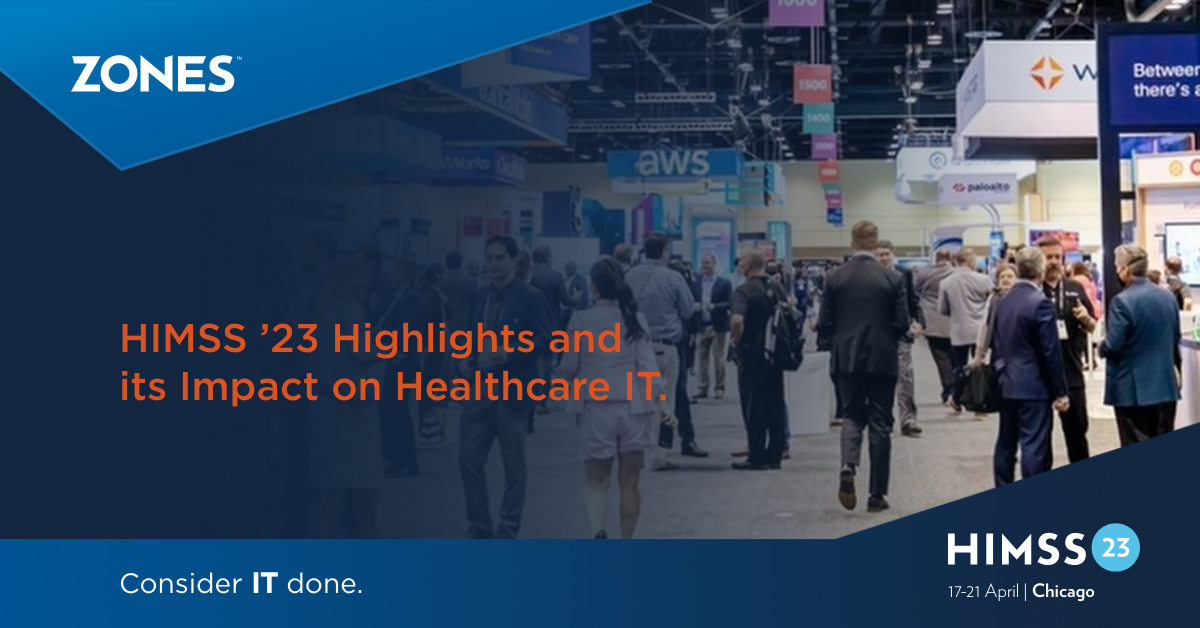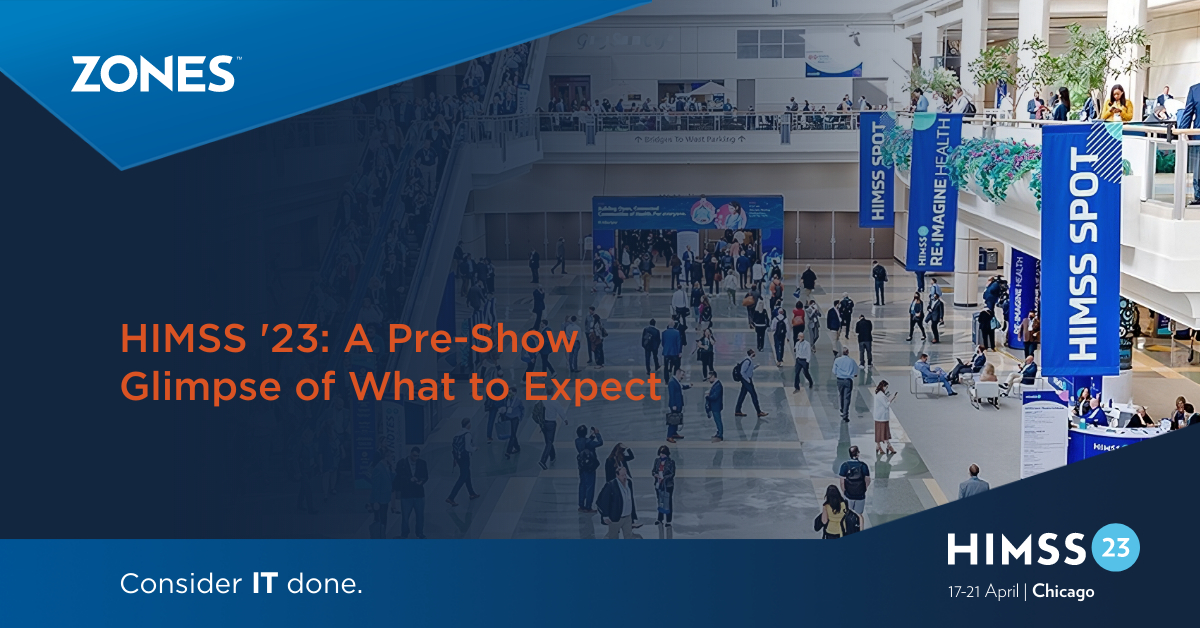HIMSS '23: A Pre-Show Glimpse of What to Expect
For over 60 years, the Healthcare Information Management Systems Symposium (HIMSS) global conference has remained a central platform for healthcare...

Uniting over 35,000 healthcare professionals, innovators, and global market suppliers at the world's largest international event on medical information and communication, HIMSS '23 kicked off on the 17th of April at McCormick Place, Chicago.
Each year, the Healthcare Information and Management Systems Society (HIMSS) hosts a series of discussions, programs, and exhibitions to showcase innovations addressing the urgent needs of the industry. Unsurprisingly, over 1,200 companies participated in this year's HIMSS conference, offering revolutionary ideas and cutting-edge solutions to the healthcare industry's most dreaded challenges.
Bringing together IT leaders from the global healthcare ecosystem, this year's conference focused on key themes such as AI, cybersecurity, big data, cloud solutions, and workforce well-being. The conference featured a plethora of thought leadership sessions, startups, and specialty pavilions designed to innovate the healthcare sector with the help of tech giants such as Microsoft, Google, and Amazon.
Those of you looking for highlights about this year's HIMSS milestones, here's a quick recap on what went down at the four-day conference.
AI, ML, and NLP
Artificial intelligence (AI), machine learning (ML) and natural language processing (NLP) are poised to play an increasingly large role in healthcare moving forward. These technologies are full of possibilities to address some of healthcare's biggest challenges. At HIMSS '23, healthcare leaders around the world discussed scaling the use of AI, ML, and NLP for better care, cost containment, operational improvements and reduced clinician workload.
During these sessions, generative AI and its role in health care took center stage, highlighting the capabilities to transform care delivery, expand precision medicine and improve the patient experience. It also discussed how healthcare organizations are teaming up with technology giants like Microsoft, Google, and Amazon to incorporate generative AI into their healthcare solutions.
In the main highlights, two of the leading tech giants Microsoft and Epic announced a new partnership to bring generative AI into electronic health records (EHR). But while the sessions about AI were thought-provoking and full of innovation, it was great to see people recognizing the potential dangers of AI in healthcare. In one of the keynote panel discussions on the future of AI in healthcare, Peter Lee, who's the corporate vice president of research and incubation at Microsoft, said: "There are tremendous opportunities here. But there are also significant risks and risks we probably don't even know about yet."
While AI could help healthcare organizations better identify patients who are at risk of life-threatening conditions such as cancer or stroke, a comprehensive level of care is required to gauge the risks of AI using algorithms. Health leaders at HIMSS shared their fears that unrestricted AI applications could create barriers in accessing patient data.
Cybersecurity
Cybersecurity was a major topic of discussion at HIMSS '23, and understandably so. Malware and ransomware attacks are the chief concerns keeping healthcare cybersecurity staff up at night. From bedside medical equipment to clinicians' mobile devices, healthcare organizations have a complex ecosystem that requires a strong security posture.
With this threat landscape in mind, security experts and healthcare leaders at HIMSS '23 shared their strategies for protecting a critically connected environment and managing business needs. These sessions also covered the rising threat of cybercriminals and how healthcare professionals can shore up their defenses using the right solutions.
This included solutions from broader segments of cybersecurity such as cloud, to the smaller niches in device security. Underlining security resilience and threat protection models, Security Operations Center as a Service (SOCaaS) and Vulnerability Assessment & Penetration Testing (VAPT) were among the leading solutions recommended by security experts.
From the employee retention and engagement standpoint, many speakers emphasized the critical deficit and burnout of security experts and technical staff in the healthcare sector. Over the years, health systems have been struggling to find and retain qualified cybersecurity professionals. Since budgets and reimbursements are down and payroll is up, information security talent is either burning out or migrating to other industries. According to the HIMSS 2022 Healthcare Cybersecurity Survey Report, lack of staff is the top barrier to robust cybersecurity for 61% of healthcare organizations.
Data management
At HIMSS '23, healthcare professionals, CIOs, government officials, and consultants all emphasized the advancements in big data and data exchange in healthcare technologies. Solutions such as data exchange platforms and intelligent data extraction are crucial for maximizing the benefits of digital healthcare.
From a governance standpoint, managing such vast amounts of data is nearly impossible in today's digitally immersive era. Almost every session emphasized the importance of data exchange platforms to translate and normalize the data between different formats and systems. From the unstructured PDF image to an HL7 and Fast Healthcare Interoperability Resources (FHIR) message, these platforms serve as a central hub for seamless data exchange between electronic health records (EHRs), medical billing, lab information, and other applications.
Integrating data exchange platforms allows the seamless transfer of clinical, financial, and operational information among healthcare IT systems in real time. This simplifies workflows, lowers costs, and eliminates errors.
Because decision-making in a clinical setting needs comprehensive, accurate and real-time data, the technology enabling access to key data across all of the EHRs is imperative. Recognizing its significance, HIMSS has introduced a new maturity model called the Community Care Outcomes Maturity Model (C-COMM). Its purpose is to emphasize the utilization of digital communication, population-based data, health information exchange, decision-making assistance, and predictive analytics to deliver tailored care in non-acute settings.
Cloud-led digital solutions
One of the main themes of HIMSS '23, cloud computing, was a recurring topic in different specialty programs, workshops, and education sessions. Clinical leaders, innovators, and policymakers from all around the world discussed the challenges and ways to leverage cloud computing in accelerating digital transformation. The agenda included several hot topics on how cloud solutions can unlock the potential of data, all while keeping health information private and secure.
During the sessions, health professionals and IT experts shared their experiences about migrating their workloads to cloud computing and artificial intelligence (AI) platforms such as Amazon Web Services (AWS).
Multinational conglomerates such as Philips showcased how they've been utilizing AWS to support their current cloud-based and AI initiatives, which includes helping radiologists examine medical images and scans rapidly, even when working from home.
Additionally, Microsoft unveiled new features in their Microsoft Cloud for Healthcare platform targeted at payers, and also updated their Azure AI Services for Health with text analytics capabilities. They also launched Windows 365 Frontline, a tool for healthcare workers and other professionals who work in multiple locations.
Similarly, Google Cloud recently introduced the Claims Acceleration Suite, which leverages AI to streamline the processing of health insurance claims and prior authorizations.
Zones at HIMSS '23
HIMSS '23 was an elevating experience for Zones. We were able to showcase our next-gen technology solutions and discuss our 2024 goals with healthcare leaders.
For over two decades, Zones has served a pivotal role in helping healthcare providers achieve improved outcomes for patients, clinicians, and staff. By leveraging best-in-class HCIT services, we've helped numerous healthcare organizations upgrade their security posture, provide elasticity to scale on-demand, improve disaster recovery and business continuity. And we're excited to extend the same level of service to you.
To learn more about our IT service solutions and our presence at the HIMSS '23 global conference, visit our website.

For over 60 years, the Healthcare Information Management Systems Symposium (HIMSS) global conference has remained a central platform for healthcare...

The events of 2020 have been challenging for businesses in a great number of ways. Corporate leaders have been forced to change everything –...

3 min read
Healthcare is one of the most sensitive industries in the world. From the joy of a new life entering the world to the anxiety of waiting for test...